Convenience Store Supplier
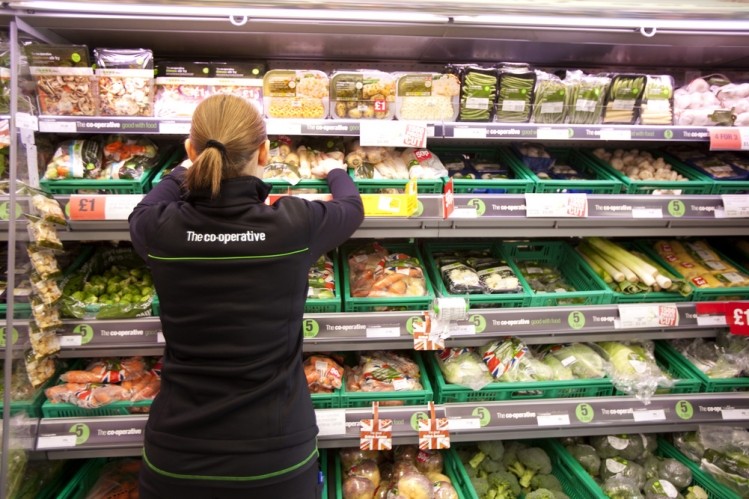
Convenience Store Supplier
Convenience store suppliers can be an invaluable way for manufacturers to distribute their products into consumers’ hands – but getting your product into these stores may not be straightforward.
Overall, wholesalers and distributors appear more upbeat about convenience store business conditions this year; however, some may remain concerned with their future prospects.
Getting Your Product Into Convenience Stores
Convenience stores (or “c-stores”) provide customers with a range of products in one central location. C-stores may sell food, beverages and snacks; newspapers; magazines; toiletries and basic household products like toilet paper. Convenience stores are typically found near petrol filling stations and usually independently owned. Some even feature grocery departments offering all types of foods.
Entrepreneurs with innovative new beverages or other unique products can turn convenience stores into lucrative business opportunities by placing them into distribution or wholesale channels. After finding your ideal distributor or wholesaler, creating an effective marketing plan that outlines key components such as price, promotion and location is necessary – as is having a solid business plan to back it all up.
When selling to convenience store chains or distributors, building rapport with their sales staff is the cornerstone of success. You must share your story and demonstrate how your product can enhance their business operations while being prepared to answer any inquiries they might have about either it or you as a company.
Many convenience stores specialize in carrying particular lines of products, like beverages or snacks, and may accept your product if it meets their standards. However, the most successful c-stores tend to have a wider selection of goods and provide customers with multiple services.
A convenience store is an ideal place to purchase gift cards, and many stores even provide money orders and wire transfer services. Some c-stores also feature kitchen facilities to produce hot foods; while others feature ATMs.
As soon as you are opening a convenience store, it is imperative that you know which licenses and insurance coverages you require for operations. Your local government office or business office should have more details on this topic so contact can be made to ascertain any particular needs in your region.
Wholesale Distributors
There are a wide variety of wholesale distributors who can assist in the distribution of convenience store products. While some focus on national markets or niches, others specialize in local ones. Distributors will work closely with stores to identify an ideal product mix for their market as well as offer marketing support and promotional services.
Offering a broad selection of products is one way to entice convenience store buyers. These may include food, beverages, paper goods, cigarettes and alcohol sales – as well as any others sold there. Gaining insight into their needs and desires may also prove advantageous.
Convenience store owners depend on wholesale suppliers for stocking their shelves with the newest and most sought-after products, so their wholesale suppliers must be capable of responding rapidly to market changes and rapidly increasing inventory levels as necessary. They should also be able to provide sales data and statistics about each item sold – this information allows buyers at convenience stores to make more informed purchasing decisions.
Convenience store suppliers must deliver the correct quantities at the right times to the appropriate locations in a timely fashion, which is especially crucial when dealing with perishable products such as produce. Adequate storage and refrigeration systems must be in place in order to preserve product quality; additionally, tracking inventory status provides another useful tool which allows suppliers to know whether more products need to be ordered or replenished from stock levels that have declined significantly.
Convenience store buyers want to feel assured they are receiving the best value for their money when purchasing products for either home or business use. Therefore, many opt to shop from multiple providers who can meet their individual requirements at competitive rates.
Convenience stores provide an ideal venue for showcasing local and regional products. By stocking a diverse array of merchandise, convenience stores demonstrate that they care about their communities by meeting every need – for example, near a golf course they might stock numerous golf accessories and magazines while those located near temporary living quarters for oil industry roughnecks might offer beer and men’s magazines for example.
Convenience Store Distributor Association
Distributors serve an essential function in the supply chain between manufacturers and convenience store owners, selling a wide array of products while expanding brands’ presence in different regions. Some distributors specialize in specific food categories while others provide all sorts of convenience goods and services; often times these partners partner with trade organizations like the Convenience Store Owners Association and Manufacturer Associations to increase business.
Some convenience store distributors also act as wholesalers for other businesses, such as gas stations, supermarkets and restaurants. Since the convenience industry is highly regulated, distributors must remain up-to-date on regulations in order to deliver exactly the amount of product necessary to each store – in some instances even owning warehouses where products can be stored with temperature-protected zones that keep products fresh for delivery.
The Convenience Distribution Association (CDA) is an essential trade organization for convenience product wholesalers in the US. Offering education, networking opportunities, and an exciting one-day Marketplace show geared specifically toward convenience product distributors across America – CDA offers education sessions focused on distributors as well as an awards luncheon, two receptions and the action-packed Marketplace floor at this annual trade show!
CDO maintains a legislative team to monitor events at state capitols to protect convenience product wholesalers and distributors’ interests, work to promote an environment friendly to business, as well as serve members by helping establish relationships with legislators.
National Alliance of Convenience and Gas Suppliers (NACS), another convenience store industry trade association, boasts more than 9,000 member companies as members and offers various resources such as its newsletter that covers issues from labor shortages to sustainability; webinars on various topics; as well as articles and videos about ways to boost sales at your business.
C-store industries are highly dynamic and rewarding environments to work in, providing many opportunities for growth in sales and profits. Partnering with wholesalers and distributors to get products into stores requires solid partnerships; at the same time it is crucial that close relationships be fostered between manufacturers and wholesalers/distributors so you can increase both.
Convenience Store Brokers
Convenience stores provide consumers with quick and convenient ways to purchase food, drinks, services and supplies quickly and conveniently. Their offerings can include beverages, snacks (such as confectionery), basic groceries, ice and petrol; their services may include money transfer services like ATMs; money transfers may be offered; some stores even remain open extended hours near busy roads or public transport hubs.
Convenience stores are typically family-run businesses and may operate either independently or be part of a larger chain. Many also provide foodservice programs which may be franchised from national brands or owned by franchisers themselves. Manufacturers will sometimes employ brokers as an efficient way to get their products into convenience stores; brokers save them time and effort while creating connections on behalf of manufacturers; they typically work on commission from 5-12%.
Before offering products to their customers, convenience store suppliers must first assess demand. As product popularity fluctuates throughout the year and can have an effect on sales, it is also crucial that a supplier be reliable when it comes to delivery times, providing stores with enough goods on request.
Convenience stores depend on their location and merchandise selection to generate profit, with beverage sales often leading the charge in terms of revenue generation. As with other retail outlets, beverage industry competition is high; manufacturers can utilize distributors with expertise to reach these stores more easily with their product offerings.
When purchasing convenience store products, consider working with a wholesale distributor offering national brand options such as Atlantic Dominion. It offers full-line convenience and food distribution to independently owned stores throughout Virginia, North Carolina and South Carolina, and has earned itself an impeccable reputation and top-of-the-line services; additionally its team has years of experience and knowledge within the convenience-store industry to help you reach your goals easily.
Here a are a few blogs that may interest you!
1. Product Distributors – How to Work with Distributors!
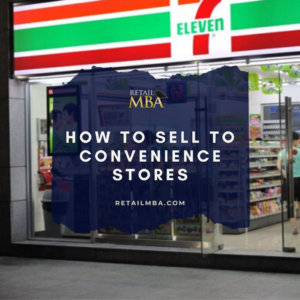
Step-by-step training on how to sell to retail chains!
We explain exactly how to do that and how to get started today. I’ve taught over 100,000 of companies over the years across the globe on how to get your products to the stores. And so we’re here to support you. Or please subscribe to our Youtube channel and or be on the lookout for additional training that we create.
We are here to expedite the process of generating revenue with your physical products and that’s what we’re all about. Take a look at our advanced training, live events, certification programs and so much more.
In this training, I will discuss some of the things to think about when approaching a retailer to sell your products and become a vendor. Hope it helps! 🙂
Karen Waksman,
Retail MBA
Questions? Contact Us!
1-855-Retail-2 (Call or Text)
Email: info@retailmba.com
Retail MBA provides a step-by-step formula on How to Sell to Major Retailers, Online Retailers, Smaller Retailers, Catalogs and More. No Experience Required! These solutions continue to convert for clients year-over-year! These are Time-Tested and Proven Strategies that we utilize ourselves when going after stores! Everything we teach, we test. Want access to these formulas? ANY one of our programs and coaching systems gives you access to them now. With that said…
Here are 5 Easy Ways to Work with Us:
1) Free Training – If You Would Like to Join Our Next FREE Webinar Training Called “Retail Chain Store Secrets – How to Sell to Major Retail Chains. No Experience Required” Then Sign Up NOW To Learn All About Selling into Retail Chains By Clicking Here!
2) Retail MBA Year Long Coaching and Training System – Our Year Long Coaching and Training System with Karen Waksman is POWERFUL! This is our most popular training and coaching system! We walk you through how to approach, pitch and sell to retail chains and we coach you along the way! Join us by Clicking Here!
3) Masterclass Intensives – Want to Join our Next 4 Week Elite Retail MBA Masterclass Intensive? These Intensives Are EPIC for people who Love Fast Paced Learning – Homework, Retail Coaching, Developing Your Strategy, Buyers Contacts and More! These Events Are Held Every Quarter. Join us by Clicking Here!
4) Done-for-You Program – If You Want Karen Waksman and Her Team to Reach Out to Your Top Dream Retail Chains On Your Behalf – And You Have a Retail-Ready Product, Check Out our Epic Done-For-You Service by Clicking Here!
5) In Person Events – If You Want to Learn LIVE and Meet Karen Waksman in Person at Our Next “America’s Next Retail Product: LIVE Event with Other Like-Minded Individuals in Beautiful San Diego, CA! We Would LOVE to Have You Join Us by Clicking Here!
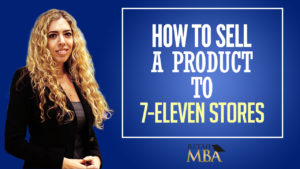
Check Out Our Additional Blog Posts Here:
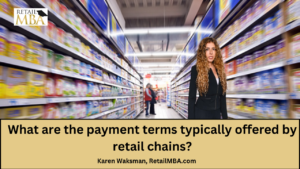
Retail Terms
Retail Terms – What are the payment terms typically offered by retail chains? Click Here to Learn More!
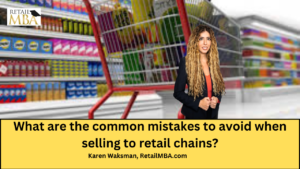
Retail Vendor
Retail Vendor – What are the common mistakes to avoid when selling to retail chains? Click Here to Learn More!

How to Sell Your Holiday Products to Retail Chains
New Training on How to Sell Your Holiday Products to Retail Chains

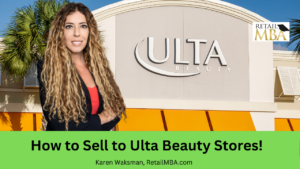
Ulta Beauty Vendor
Ulta Beauty Vendor – How to Sell to Ulta Beauty Stores. Click Here to Learn More!
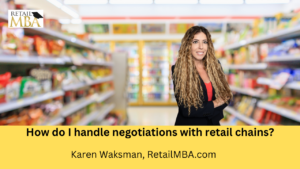
Retail Strategy
Retail Strategy – How do I handle negotiations with retail chains? Click Here to Learn More!
